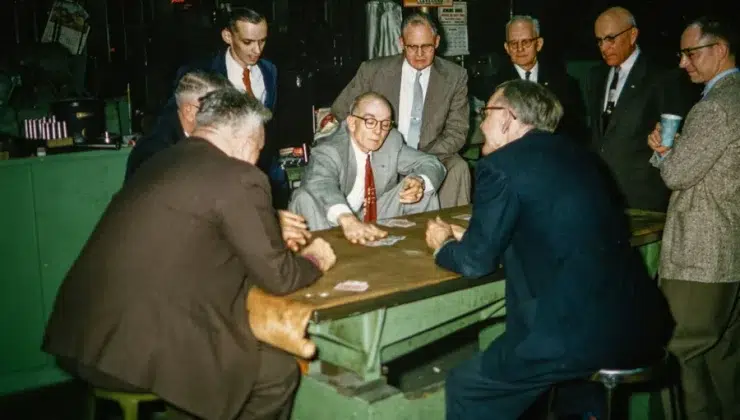How Texas Became the Beating Heart of Game in America

Entertainment isn’t just about flashy lights or Hollywood drama: it’s about connection, competition, and, sometimes, a little luck. In our article on Entertainment: The Art of Enjoyment and Escape, we talked about how entertainment has always been a part of human history and culture. Card games, in particular, have long been a cornerstone of American leisure, tracing back through frontier saloons and kitchen tables alike. Among these, poker reigns supreme.
According to one YouGov survey, a striking 60% of Americans have played poker at least once in their lives. More than a passing hobby, poker is a cultural ritual that’s shaped how we socialize, celebrate, and even gamble. Poker is more than a card game; it’s a window into the American spirit: strategic, bold, and endlessly adaptable.
But nowhere is poker more synonymous with identity than in Texas. From the dusty trails of the Old West to the neon-lit poker rooms of Houston and Dallas, the Lone Star State has shaped the game as much as it has been shaped by it. And while Texas Hold’em is now the most popular variation of poker worldwide, its roots run deep through Texan soil. So, how did Texas become the cradle of American poker, and what does the future hold for the game in the state? Let’s shuffle up and deal.
From Saloon Tables to the Birthplace of Hold’em
Poker first made its way into Texas in the 1800s, arriving via riverboats, trade routes, and traveling soldiers. The game quickly found a home in the rowdy saloons of the frontier, where luck and bravado were currency just as much as chips. Back then, variations like Five-Card Draw were the norm, but it wasn’t long before innovation struck in the form of Texas Hold’em.
Though the exact origins of Texas Hold’em are debated, most historians agree it was first played in Robstown, Texas, in the early 1900s. The game spread slowly at first, but by the 1960s it had reached Las Vegas, thanks largely to Texan players like Doyle Brunson and Crandell Addington, who saw its strategic depth and compelling action as far superior to other forms. Today, Texas Hold’em is poker’s gold standard. It dominates tournament circuits and home games alike. In fact, Britannica calls it “the most popular form of poker in the modern era,” owing its meteoric rise to both its simplicity and complexity.
Yet for all its influence on the poker world, Texas itself maintains a paradoxical stance toward gambling. As per a feature from KERA News, commercial casinos are still prohibited in the state. But that hasn’t stopped poker from thriving, through a unique legal workaround: membership-based poker clubs.
These clubs don’t take a rake from the pot. Instead, they charge hourly seat fees or membership dues, skirting around traditional gambling laws. This clever model has birthed a flourishing grassroots poker scene across major cities like Austin, Houston, and Dallas. Each venue becomes more than a club; it’s a community center for card-slinging strategy and friendly rivalry. Despite its legal gray areas, Texas poker culture is alive and well and growing by the day.
The Digital Deal: Online Poker and the Texan Hustle
As poker evolved with the digital age, Texas players found themselves in a peculiar spot. While live poker was flourishing in local clubs, online poker presented both opportunity and challenge.
State-regulated online poker is not currently available in the state. But that hasn’t stopped the growth of online poker in Texas. With reputable offshore platforms, including the widely trusted Americas Cardroom, players across the state continue to enjoy online poker legally. Americas Cardroom has become a staple for Texan grinders, offering fast payouts, robust tournament schedules, and substantial traffic.
Online poker is a catalyst for new waves of talent and competition. From West Texas ranchers to Dallas tech workers, players now sharpen their skills on digital felts before ever setting foot in a live poker room. The accessibility of online play has opened the doors for thousands of Texans to pursue poker not just as a pastime, but as a semi-professional or even professional pursuit.
This duality—live clubs in bustling cities and online tables accessible from anywhere—means that poker in Texas has reached a new hybrid era. It’s both old-school and modern, local and global.
Texas: A Hotbed of World-Class Poker Talent
In recent years, Texas has also become a place where poker legends are made. The state has long been home to some of the game’s most formidable players, and 2024 was no exception. Then, two standout Texans surged into the spotlight. Jonathan Tamayo of Humble, Texas, clinched a coveted WSOP bracelet, marking a milestone in a career that’s been steadily rising. Tamayo, a quiet force in the poker world, showed the discipline and fearlessness that define the very best of Texas poker, outlasting 10,000 opponents.
Meanwhile, another Lone Star contender, Malo Latinois of Carrollton, emerged as the unofficial chip leader late in the Main Event. At one point, he commanded over 66 million chips with just 30 players left in contention for the staggering $10 million first prize. His run was reported as one of the most exciting developments of the tournament. Their success is no anomaly. Texas has always produced elite poker talent: players who embody the state’s values of boldness, independence, and grit. From legends like Doyle Brunson to modern stars like Tamayo and Latinois, Texas continues to dominate the poker world stage.
As more local clubs open and online options expand, the pipeline of talent coming from the state shows no signs of slowing down. It’s only a matter of time before the next global champion emerges from the backrooms of a Houston poker club or the digital tables of an Austin apartment.
Final Deal
For Texas, poker is its own kind of legacy. The Lone Star State has profoundly shaped the past, present, and future of poker
Despite legal restrictions on traditional casinos, poker has found fertile ground in the hearts of Texans through innovation, community, and a deep cultural love of the game. With online poker making the game more accessible than ever and Texas natives continuing to make waves at the highest levels, this state’s poker story is far from over. So whether you’re shuffling up at a private club in San Antonio or firing up a tournament on your phone in Amarillo, one thing’s clear: In Texas, poker is more than a pastime. It’s a way of life.










